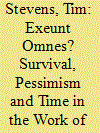|
|
|
Sort Order |
|
|
|
Items / Page
|
|
|
|
|
|
|
| Srl | Item |
| 1 |
ID:
159791


|
|
|
|
|
| Summary/Abstract |
John H. Herz (1908-2005) is better known for his theorisation of the security dilemma than for his conviction that human survival is threatened by the conditions of late modernity. This article explores extinction and survival in his work to interrogate his persistent characterisation as an incorrigible pessimist. In his preoccupation with extinction, Herz would seem a first-rank pessimist, but his intellectual commitments belie this easy categorisation. Specifically, his appeals to interdisciplinary ‘survival research’ suggest a qualified pessimism that does not foreclose on the potential of humankind to overcome structural, political and normative obstacles. This is consistent with current understandings of pessimism within the broader realist tradition. Herz expressed an ‘open’ and ‘linear’ temporality that challenges cyclical and linear-progressive temporalities inherent to realism and liberalism, respectively. Herz articulates, therefore, a ‘productive pessimism’ that charts a different path for pessimist thought beyond its pejorative connotations. This article contributes to the literature on classical realism, to a growing interest in Herz’s intellectual legacy, and to the developing appreciation of time and temporality in International Relations theory and practice. It also provides a foundation for rethinking our assumptions about pessimism and international politics.
|
|
|
|
|
|
|
|
|
|
|
|
|
|
|
|
| 2 |
ID:
159794


|
|
|
|
|
| Summary/Abstract |
Haiti, Liberia and Ethiopia existed precariously, between the world wars, on the edges of an international order dominated by Europe. The only independent states at the League of Nations governed by people of African descent,1 each faced an incursion that effectively vitiated its legal sovereignty. Haiti was occupied by the United States from 1915 to 1934. Ethiopia was occupied by Italy from 1936 to 1941. Liberia was placed under financial receivership, formally investigated by the League and threatened with occupation between 1929 and 1936. Peripheral to the international society which sought to extinguish them, they became central to global, and especially pan-African, anticolonialism. Many participants in anticolonial movements across Africa and the Caribbean after 1945 had been deeply affected by a political and theoretical engagement with the interwar experiences of these states. The outcomes of interwar political developments in Haiti, Liberia and Ethiopia were widely seen, by both their supporters and detractors, to have major ramifications for the colonised world, especially the African continent and diaspora. It is surprising, then, that comparative studies of these states have been so rare in modern scholarship.
|
|
|
|
|
|
|
|
|
|
|
|
|
|
|
|
|
|
|
|
|